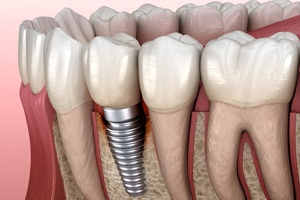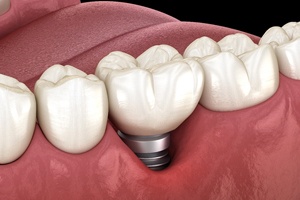
Dental Implant Failure & Salvage – Northborough, MA
Preserving Your Restored Smile

Dental implants thrive in more than 95% of cases — there is no reason for you to expect that something will go wrong with your restored teeth. However, it is important that you be aware of the possibility of a failed dental implant in Northborough. If you ever believe that you may be suffering from this problem, contact us right away. We will evaluate the situation, recommend a treatment, and do all we can to preserve both your oral health and your dental implants.
Why Do Dental Implants Fail?

When dental implants in Northborough fail, it is usually due to an infection known as peri-implantitis, which occurs when bacteria attack the bone and gums around an implant. Eventually, the damage can become so severe that the mouth is no longer able to support the implant. Missteps in oral hygiene are often a major contributing factor to peri-implantitis.
Other possible causes of implant failure include:
- Physical trauma, such as a hard blow to the mouth or long-term teeth grinding.
- Certain medical conditions, such as some types of cancer and other serious diseases.
- Failed osseointegration (the implant never bonds properly with the surrounding bone).
Symptoms of Failed Dental Implants

There are two broad categories of dental implant failure. Early failure occurs shortly after the initial placement surgery, while late failure can happen months, years, or even decades later. Because implants can face problems at any time, it is important that you always be on the lookout for the following symptoms:
- Unusual pain. Some discomfort is normal after the initial implant surgery. However, severe pain and pain that occurs after you have had your implants for a while are big red flags.
- Difficulty chewing. After you get used to your implants, it should be easy for you to consume virtually any food. Difficulty eating might point to a problem with your restored teeth.
- Signs of infection. Red gums, receding gums, pus, and other signs of infection call for a prompt visit to your dentist.
- An implant feels loose. In some cases, this is due to a problem with the implant’s restoration. However, the issue could be related to the implant itself.
How Dental Implant Salvage Works

Call us as soon as you believe there is a problem with your dental implants. Delaying treatment may allow the issue to get worse, increasing the chances that you will require extensive or complex procedures.
When you arrive for your appointment, we will perform a visual examination of your mouth. We might also take some X-Rays or use our CBCT scanner to understand what is happening beneath your gumline. After we gather some information, we will be able to recommend a treatment.
In some cases, something as simple as antibiotic therapy or a new restoration is all that is necessary. However, if the damage to the implant or your oral tissues is severe, we may have to remove the implant altogether. You might also require a bone graft or other restorative treatments. After a healing period of several months, it might be possible for us to insert a new implant.